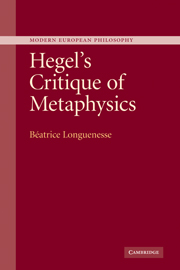Book contents
- Frontmatter
- Contents
- List of Abbreviations
- Note on Citations
- Preface
- PART I HEGEL'S CRITIQUE OF METAPHYSICS: A STUDY OF THE DOCTRINE OF ESSENCE
- Introduction
- 1 Transcendental logic and dialectical logic: from Kant to Hegel, a critique of all dogmatic metaphysics
- 2 Twists and turns of Hegel's contradiction
- 3 Ground against concept?
- 4 What is rational is actual, what is actual is rational
- Conclusion
- PART II POINT OF VIEW OF MAN OR KNOWLEDGE OF GOD
- Notes
- Bibliography
- Index
Introduction
from PART I - HEGEL'S CRITIQUE OF METAPHYSICS: A STUDY OF THE DOCTRINE OF ESSENCE
- Frontmatter
- Contents
- List of Abbreviations
- Note on Citations
- Preface
- PART I HEGEL'S CRITIQUE OF METAPHYSICS: A STUDY OF THE DOCTRINE OF ESSENCE
- Introduction
- 1 Transcendental logic and dialectical logic: from Kant to Hegel, a critique of all dogmatic metaphysics
- 2 Twists and turns of Hegel's contradiction
- 3 Ground against concept?
- 4 What is rational is actual, what is actual is rational
- Conclusion
- PART II POINT OF VIEW OF MAN OR KNOWLEDGE OF GOD
- Notes
- Bibliography
- Index
Summary
Numerous are the witnesses now coming forward in favor of a revision of the trial in dogmatism which Hegelian philosophy has had to endure. Hegel's Logic was the first accused in this trial. Benedetto Croce noted in his time that British Idealism had done Hegel a disservice by presenting Hegel's Logic as a systematic worldview and a universal method of knowledge. The philosophies of history that flourished at the end of the nineteenth century, as well as one version of Marxism – that which finds expression in Friedrich Engels' Dialectic of Nature – played a similar role. A romantic description of universal laws common to nature, history, and thought was attributed to a thinker who adamantly opposed philosophical romanticism. As a result, the mere appeal to common sense all too often sufficed to dismiss Hegel's philosophy and, in particular, Hegel's Logic.
Today, however, the situation is different. In his Introduction to the issue of Hegel-Studien devoted to “The Science of Logic and the Logic of Reflection,” Dieter Henrich writes:
After the revival of Hegelian philosophy at the beginning of this century, the Phenomenology of Spirit has for a long time been the center of attention in Hegel studies. […] The Science of Logic was considered to be evidence of a genius that outlived itself, in which the real motivations and force of Hegel become visible only indirectly; and at the same time, as a work which had inspired an anachronistic Victorian Hegelianism.
This judgment has since undergone revision. […] […]
- Type
- Chapter
- Information
- Hegel's Critique of Metaphysics , pp. 3 - 9Publisher: Cambridge University PressPrint publication year: 2007



